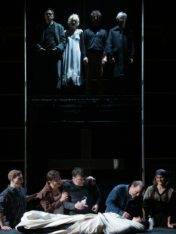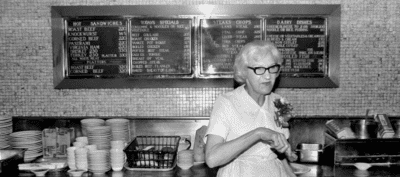Richard Topol in 'Our Class' (Photo by Pavel Antonov)
‘Our Class’ at BAM: A horrible history brought to life
A play about a nearly forgotten 1941 pogrom in Poland shocks and resonates in 2024

The cast of ‘Our Class’ (Pavel Antonov
Watching “Our Class,” a 2009 play by Polish playwright Tadeusz Slobodzianek now staged at BAM Fisher’s Fishman Space through February 11, feels like repeatedly being kicked in the gut.
That is, perhaps, the exact feeling that director Igor Golyak was hoping to elicit when working on a production inspired by the 1941 pogrom that took place in the northeastern Polish town of Jedwabne during World War II.
As history has it, on that day, the town’s Jews were forced to assemble in the square as their non-Jewish neighbors assaulted and tortured them before marching them inside of a barn that they then set on fire. Estimates vary greatly, noting that between 300 and 2,000 Jews were burned alive.
On the surface, the show follows 10 classmates, five of which are Jewish and five of which are Catholic, as they grow up together and eventually turn against each other during World War II.
According to Slobodzianek himself, who has seen his script staged all over the world since the original 2009 London premiere of the show, “Our Class” is a discussion about public consciousness.
“When I heard about the story of Jedwabne, I was shocked,” he tells Brooklyn Magazine. “I realized that this is one of the darkest Polish myths, which we have pushed into unconsciousness, and which says a lot about our humanity. That an executioner can be a victim and a victim an executioner has been nothing new since the Bible and Greek tragedy, but the realization that we are not just angels is a separate matter.”
As disturbing as the various scenes depicting all types of violence are, it is the erosion of the friendships in question and the clear display of the evil that humans are capable of that leave audience members at BAM most distraught: A few times during a recent staging of the over three-hour-long show, ticket holders walked out before the play ended, quietly whispering “I can’t watch this.”
That discomfort may have just as much to do with the massacre of October 7, 2023, which spurred an intense war in the region. More than 1,100 people — mostly Jewish civilians — in Israel were massacred and raped by Hamas terrorists and 240 civilians were taken as hostages. Half of them are still missing — and are part of the justification for the controversial ongoing Israeli Defense Forces counter-attack on Gaza where the death toll among militants and civilians has by Hamas’ estimates surpassed 26,000.
In a way, the show seems to scream that the attack on Israel a few months ago is an echo of the events that unfolded in Poland 83 years ago — and may very well happen again anytime anywhere. The brother-against-brother dynamic of the violence adds a level of murkiness to it all, muddying the moral clarity of each side and echoing true today as well. The fact that the play actually first premiered 15 years ago drives that point home further.
“It’s a mystery to me how the story is still relevant,” says Slobodzianek. “A play that deals with a Polish memory problem was performed on every continent, I don’t know why. Maybe because it touched upon a sensitive historical subject: how historical art is now contemporary art.”
As for the importance of staging the production on American soil, Slobodzianek believes that, perhaps, America’s global standing demands the country take the themes explored in “Our Class” seriously.
“Globally, America is still a myth, a promised land for people unable to find a place in their homelands because of economic, political, social, religious, racial and sexual exclusions,” said the playwright. “Perhaps, in America, it is good to confront these sorts of issues.”
“Our Class” is being performed at BAM Fisher’s Fishman Space now through February 11. 30 Lafayette Avenue. Tickets start at $59.
You might also like 


























